UW Medicine nurses are, to put it simply, incredible. Their unwavering commitment, compassion and professionalism make a difference in the lives of our patients and their families (read raves and notes of gratitude from our patients and the community). In celebration of National Nurses Week, we follow the careers of six nurses across UW Medicine who work in different specialties, from medical oncology to emergency flight services. What they have in common, besides a focus on evidence-based excellence, is that they all graduated from, or are currently enrolled at, the University of Washington School of Nursing. Clinical education programs are offered at all University of Washington campuses: Seattle, Tacoma and Bothell. Find out how these featured nurses’ education impacted their career at UW Medicine.
Kate McMonagle (She / Her), RN, BSN, Medical Oncology ICU, UW Medical Center – Montlake
Master of Nursing, School of Nursing & Health Studies, University of Washington Bothell, June 2024
When I was a young teen, I was diagnosed with a blood disorder. My primary care provider was a nurse practitioner who specialized in hematology-oncology. She really inspired me. Then, when I was in nursing school, my dad became very sick — he was in the hospital for over 100 days, much of that time in the Intensive Care Unit. I spent a lot of time at his bedside and witnessed the nurses working as a multidisciplinary team to try to save his life. That’s what led me to become an ICU nurse.
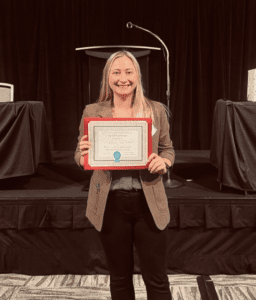
Kate McMonagle wins the best research poster at the Seattle Nurse Research Conference.
Now, I’m an assistant nurse manager, and the role gives me the best of both worlds; I get to spend half the week working with nurses or at the bedside directly with patients and the other half in the office. I like being able to improve things for our nurses — they do such hard work. It can be as simple as looking up an IV infiltration policy for a busy charge nurse or doing a more thorough review of a workflow that isn’t effective.
Getting my master’s in nursing at the University of Washington while working at UW Medicine has provided unique opportunities. For example, my fieldwork coincided with the building of the new Center for Behavioral Health and Learning, and I worked with a policy subgroup to evaluate which policies needed to be revised or drafted for the center. I was interested in larger theoretical questions about how you know what to include and exclude from policy, and I took those thoughts back to my assigned scholarly chair, and the work became my capstone project. I had never done research before; Dr. Jamie Shirley mentored me. I conducted interviews about developing and implementing policy, and I recently presented my work at the Seattle Nurses Research Conference, went before the Institutional Review Board and created a poster presentation that was awarded the best research poster. Within the program, I felt supported to be able to achieve my goals.
Now, having that research mindset from my master’s in nursing, I see how the care we provide at UW Medicine is backed by evidence. It’s a remarkable institution. I hear of nurses who come here as travelers and never leave. We’re a part of something bigger. There’s so much meaning behind this work, regardless of what role you’re in.
Zulfa Yassin Nuri (She / Her), RN, BSN, CNRN, Continuity of Care Nurse, Neurology, Harborview Medical Center
Bachelor of Science in Nursing, School of Nursing and Healthcare Leadership, University of Washington Tacoma, 2012
I grew up in Ethiopia and came to the U.S. in 1996. I’m the eldest of 11 siblings, so I was the caretaker. My mother used to have asthma, and I would also need to care for her. I was always interested in science and the human body, and from a very young age, I knew I wanted to be a nurse.
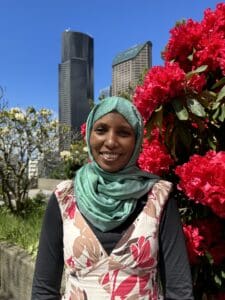
Zulfa Nuri, RN, BSN, CNRN
I attended the nursing program at the University of Washington Tacoma while working at Harborview. The experience opened other career windows to me; I saw there were different types of nursing positions beyond being a bedside nurse. For example, we went to a community center where the nursing role was focused on prevention. It broadened my view of nursing — there’s the nurse who works at the bedside when someone has been in a car accident, but there’s also the nurse who advises on preventative aspects like diet and exercise and demonstrating blood pressure readings. I was attracted to work at Harborview because of its mission. When a person is in a hospital gown, it doesn’t matter what their social status is or the barriers they face; they only need our help getting them through a difficult time. I started in orthopedics and eventually moved to neuroscience, where I’m currently a discharge facilitator.
The brain has always fascinated me; our brains manage and monitor everything. In my role, I get to see the progress of a brain repairing itself. For example, a stroke patient may not be able to talk or walk, and I’m able to observe their progress over time and their increased ability to move and converse.
My schooling has also influenced my role outside of Harborview; my community knows me as a resource for both answering questions about their health and navigating the healthcare system.
Brandon Ibarra (He / Him), Nurse Practitioner, Wound, Ostomy, Limb Preservation and Amputation Services, Harborview Medical Center
Doctor of Nursing Practice, School of Nursing, University of Washington, 2016
I grew up in rural Southeast Idaho and was the first person in my family to go to college. When my mother passed away when I was 16, I moved in with my grandfather. My path to nursing wasn’t about chasing a dream — it was about finding a way forward, given my circumstances. I consider myself fortunate because nursing has not only provided me with a means to pay my bills but has also helped me become a better person. Reflecting on patient encounters has deepened my understanding of empathy and resilience, shaping not only my career but also my outlook on life. What started as a practical choice has evolved into a journey of self-discovery and growth.
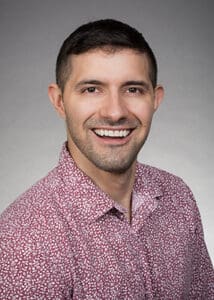
Brandon Ibarra, DNP
I earned my nurse practitioner degree at the University of Washington and joined Harborview as a nurse technician. While many factors drew me to this institution, the dynamic academic environment and unwavering commitment to excellence kept me here. Working at an academic institution has been so rewarding. The emphasis on learning and development alongside patient care fosters a culture of growth and innovation. Collaborating with experienced colleagues and engaging in interdisciplinary research projects has enriched my professional journey and expanded my skill set. Moreover, witnessing the mission of the hospital in action reaffirms my dedication to serving our community.
Working within the Harborview clinical education department has given me a unique perspective on the impact of my UW School of Nursing education. My involvement in clinician education and quality improvement initiatives allows me to apply school-taught concepts in real-world scenarios. Witnessing the benefits of program evaluation and quality improvement efforts in enhancing patient outcomes has been immensely rewarding.
Amidst the challenges of our medical system, I’ve found resilience and hope through active participation in hospital initiatives beyond direct patient care. Whether contributing to quarterly pressure injury surveillance research, assisting with the Quality Champions program, teaching classes or serving on the hospital-acquired pressure injury review committee, I’ve seen the power of collective action in driving change. I encourage fellow healthcare professionals, especially floor nurses, to seek out opportunities within their units, join unit practice councils or assist the Wound Care team. By engaging in initiatives like these, we not only enhance patient care but also foster a culture of continuous improvement and innovation within our healthcare institutions.
Anna Wilson (She / Her), BSN, VA-BC, CCRN, Vascular Access, UW Medical Center – Montlake
Master of Nursing, School of Nursing & Health Studies, University of Washington Bothell, May 2025
I became a nurse somewhat by chance; however, I am grateful for the decisions that sent me on this path. I spent the first 33 years of my career specializing in pediatric critical care. In 1994, while living in California, I read a newspaper ad for a pediatric flight nurse position in Seattle. I ended up flying with Airlift for nearly 15 years. I believe aeromedical transport is not just a job but a lifestyle. The shifts are 24 hours and require commuting to a remote airfield with a base. The work can be intense but fulfilling. This environment led to the development of close, long-lasting friendships with other team members. Eventually, I realized I needed a change from the long shifts with disrupted sleep and decided to stop flying.
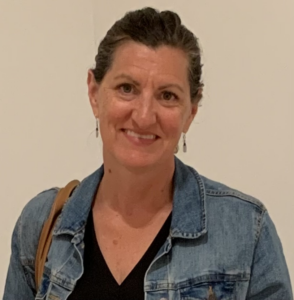
Anna Wilson, BSN, VA-BC, CCRN
Nearly three years ago, I was hired to work per diem on the vascular access team at UW Medical Center – Northwest and, after a little while, transferred to a full-time position at the Montlake campus. My teammates have been welcoming and supportive, helping me continue to learn and round out my skill set.
I started my master’s in nursing degree some time ago but put it on hold due to other family priorities. Recently, there was a position I was interested in that required a master’s in nursing degree. I contacted the nursing program at the University of Washington Bothell and started classes in January. Getting my brain back in school mode was difficult, but my work team and the School of Nursing have been completely supportive and encouraging.
In my nursing research and program development courses at the School of Nursing, I concentrate on evidence-based practices related to peripheral intravenous catheter placement and management. Immersing myself in this material helps me continue to learn and may lead to practice updates for the vascular access team and the patients we see. Returning to school has presented opportunities to connect and network. Working and attending school takes a lot of energy, but I’m a part of an organization that reflects excellence and is as committed to it as I am.
Elise Blasco (She / Her), RN, CFRN, CEN, Assistant Director of Operations, Airlift Northwest
Bachelor of Science in Nursing, University of Washington, 2004
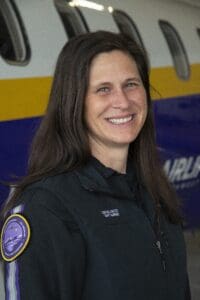
Elise Blasco, RN, CFRN, CEN
I was one of eight UW School of Nursing students chosen to participate in the school’s first study abroad program. This experience fostered my love of travel and put me on track for my first job in nursing. After completing a semester in Thailand, I returned to Seattle, hooked on the field of international community medicine. After graduation, I first worked at a clinic for newly immigrated mothers and their babies. As a community health nurse, I focused on the planning and implementation of care for this vulnerable health population.
I then worked in Central America, and when I returned to Seattle to work in an emergency department, I saw two nurses in blue flight suits transporting a patient. From that moment, I knew that I wanted to become a flight nurse for Airlift Northwest. I moved to Juneau, Alaska, for an Airlift position sight unseen. What initially drew me to medevac nursing was not only its autonomy but the knowledge required as a flight nurse. Like working in the ER, one must be confident working with patients of all ages and with multiple diagnoses. In time, I wanted to learn more about Airlift’s operations and business side. Now, as the assistant director of Operations, my job is to set my team and region (Alaska) up for success. This covers everything from hiring nurses to ordering medication to staffing to working with my executive team on Airlift’s strategic plan. I love that I get to use my brain in different ways.
For people who live in southeast Alaska, medevac is a part of life. We have amazing providers, but due to the limited population and geographical location, people often lack access to advanced medical care. I’m passionate about the care that Airlift provides for the residents of Alaska because I know that one day we may transport my family, my friend, my neighbor, and I want them to receive the best care possible while en route.
Marcos San Martin (He / Him), MBA, MN, RN, Nurse Manager, Orthopedic / Neurosurgery Unit , UW Medical Center – Northwest
Master of Nursing, School of Nursing & Health Studies, University of Washington Bothell, 2019
As a first-generation immigrant from Argentina, I came to America in 2008 with a background in business. I never thought I’d work in healthcare. My interest was inspired by seeing how advanced nursing is as a profession in the United States; elsewhere nursing can be limited to the care of patients without opportunities for advanced practice. Also, two friends, both nurses at UW Medical Center, suggested this career path.
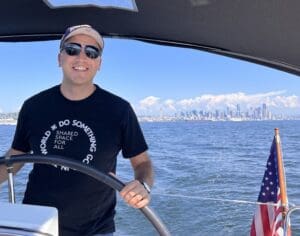
Marcos San Martin, MBA, MN, RN
Since making that decision, I’ve worn several hats: as a volunteer, CNA, unit secretary, RN2, RN3, and now as a manager for the last five years. One of the reasons I started on the leadership path is to be an agent of change by supporting my peers through new tools and innovation. I became a nurse manager after having worked as an RN3 for a few years and then completed the Master of Nursing degree at the UW School of Nursing, Bothell. I don’t regret any step of my nursing career.
The UW School of Nursing has shaped me as a leader. The School of Nursing made learning interesting, helped me understand complex healthcare issues, and exposed me to well-informed discussions and formal research. Now, with that foundation, I develop solutions to the day-to-day issues we face in healthcare.
Being at UW Medicine enhanced my ability to serve our patients and coworkers in any position I’ve held. This also gave me opportunities, including being accepted into the Master’s in Nursing program at the University of Washington and advancing my career objectives. UW is beyond a university, and UW Medicine is beyond a healthcare system.
Editor’s Note: Responses were lightly edited for length, clarity and style. Any information or opinions shared in this article are personal views, and do not represent those of the University of Washington or UW Medicine in any way, shape, or form.



